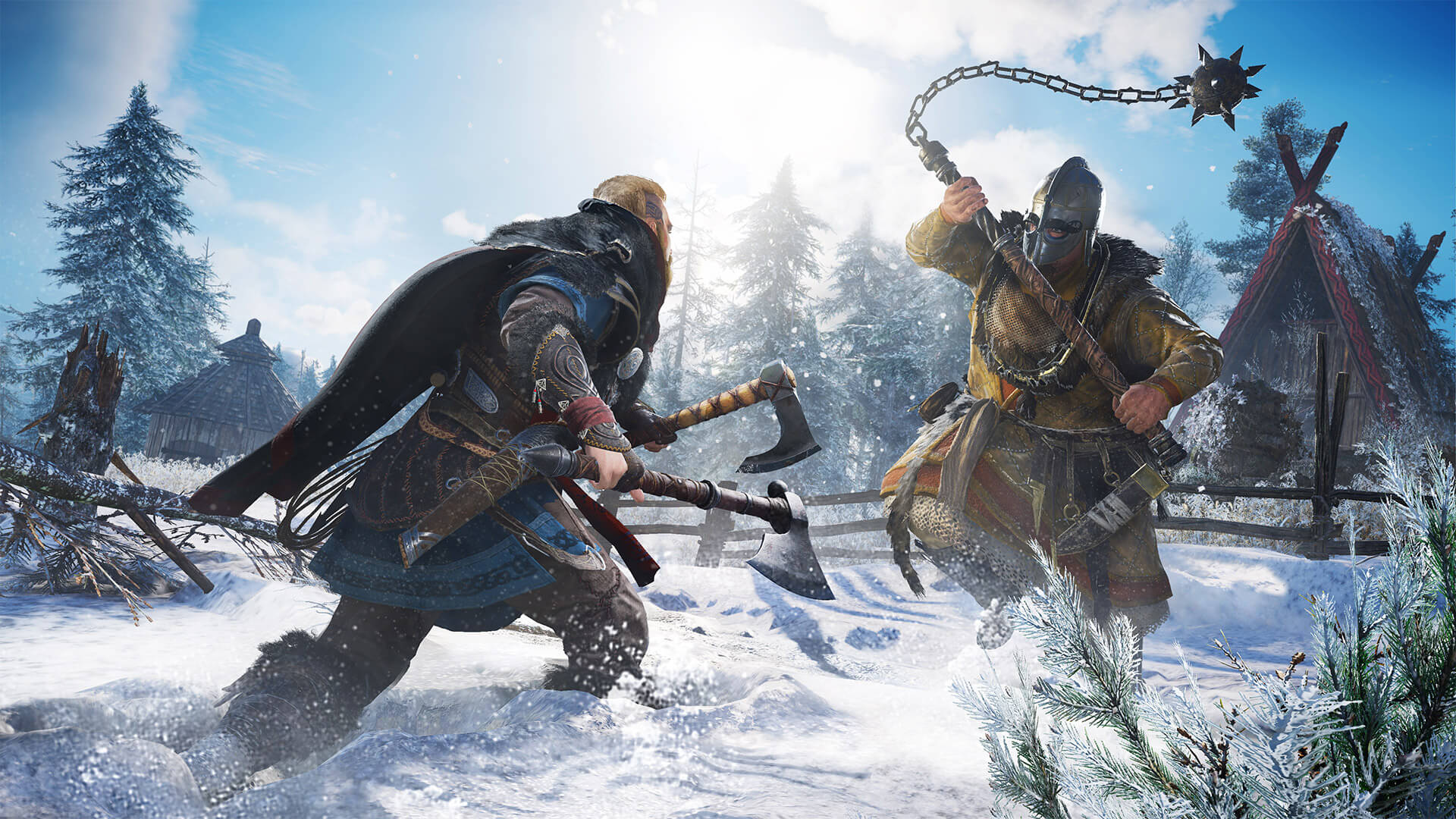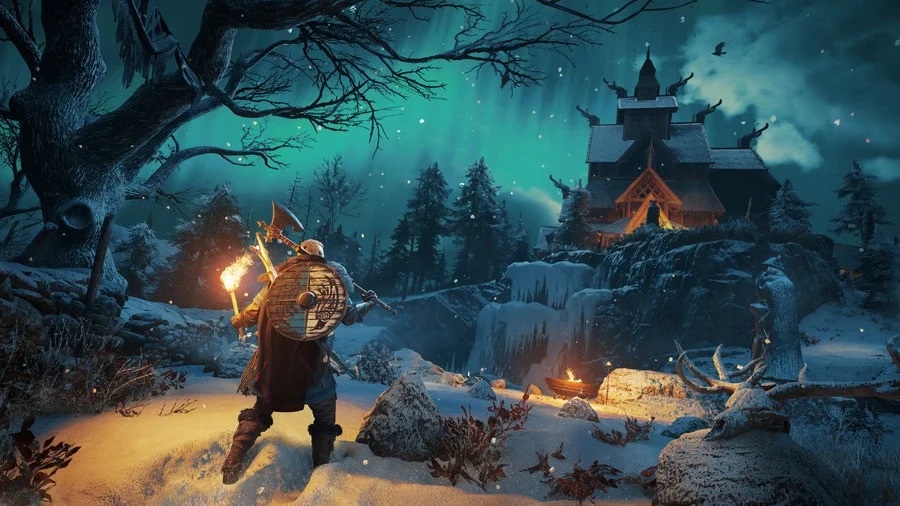9th century England is the perfect setting for Assassin's Creed Valhalla
Eivor's showing up at just the right time.

Ubisoft has a knack for finding fascinating historical flashpoints within which it can set its long-running stabbing and climbing series, and with Assassin's Creed Valhalla's 9th century England, it may have found the perfect setting. Now that it's been revealed, I'm only surprised that it didn't happen sooner.
England's a bit of a clusterfuck during this period, and rather than making landfall in one homogenised country, Eivor and their Viking pals will find themselves on an island with several competing kingdoms, cultures and religions, none of which get along very well.
The Saxons under Alfred the Great, King of Wessex, appear to be Valhalla's antagonists, but you've also got the Celts in Wales and Scotland, the English kingdoms of Mercia and, in the north, Northumberland, and cutting the country in half, Danelaw. Eivor and Co are just the latest wave of Scandinavian invaders, with the Danes arriving more than 70 years before, first as raiders and then as settlers. With this division comes countless battles and plenty of intrigue. 9th century England was full shifting borders, backstabbing nobles and kings with huge ambitions.

It's interesting to see Valhalla making the Viking invaders, or at least one of them, the heroes, because in 873 the English were really the underdogs. Alfred was a new king who took over after his brother's death, and though he'd go on to lay the seeds for a united England—it wouldn't be for another two generations that this would actually become a reality—the start of his rule was marked by significant losses and concessions to the Danes.
Yet Alfred still seems like the perfect antagonist for an Assassin's Creed. The war between the Assassins and Templars (and their predecessors) can largely be broken down to a war for freedom. The bad guys want to control everyone and the good guys just want to be free. Through his advocacy of the (old) English language, administrative and legal reforms, arranged marriages, eventual victories over the Vikings and his declaration that he was the King of the Anglo-Saxons, Alfred slips comfortably into the role of England's architect and puppet master.
If you've been watching the recent BBC adaptation of Bernard Cornwell's The Last Kingdom, this might be the version Alfred you're most familiar with. Like all of Cornwell's historical novels, he takes plenty of liberties, though there's still a fair amount of historicity. In The Last Kingdom, he's ultimately presented as a wise and just ruler, but he's also quick to screw over whoever he needs to in his desire to unite England, including the protagonist, a warrior who just wants to reclaim lands that were stolen from him.
Alfred as an agent of whatever the precursors to the Templars are calling themselves in 873 makes perfect sense, and while historians have been pretty favourable when it comes to their descriptions of him, he has most of the traits of an Assassin's Creed villain.
Keep up to date with the most important stories and the best deals, as picked by the PC Gamer team.
We already know Eivor will be able to conduct diplomacy and make alliances with England's nobles, and this is very much in keeping with the historical period, where the Vikings, settled Danes and Saxons would come to the table to make deals, even though they might have hated each other. And if Alfred is going to be this big bully, it also makes sense that his fellow Saxon rulers might make alliances of convenience to stem his power and influence.
Then there's the religious conflict. The Templars used Christianity to control people, but in 873 England still had plenty of pagans. The Saxons had converted long before, but in Danelaw it was all about paganism. That obviously didn't sit well with the Saxons, including Alfred, who even forced the Danish warlord Guthrum to convert, becoming his godfather.

As we know from the trailer, Eivor is very much a pagan. In the battle, witnessing a sign from Odin gives him confidence that they can win. Paganism is often presented as standing against Christianity, keeping 'old ways' alive in the face of a religion that wants to convert everyone. The theme of freedom versus authoritarianism once again rears its head. It does feel a bit like Eivor, then, represents rebellion against religious authority.
Or it might just be an excuse to squeeze some badass Norse mythology into the game. Since Origins, myth has played an increasingly large role in Assassin's Creed, and I'm pretty excited to see Odin and the gang getting up to magical mischief. But the setting of 9th century England also gives Ubisoft an opportunity to explore Britain's older myths, too. There's lots of room to explore Celtic folklore, even though by this point Germanic paganism and Christianity had taken hold.
Valhalla also promises to give us a look as what's going on beyond the cultural and religious conflicts. In the trailer, while Alfred is bemoaning the fact that the Vikings don't care about family or nation, we see Eivor just hanging out in a village and playing with kids. While the Vikings are still often presented as raiders, sailing across the world raiding undefended villages, they were also settlers, looking for a new place to call home with slightly nicer weather.

It makes sense, then, that Ubisoft is giving us a settlement to nurture. You'll recruit more warriors and build a barracks, but you'll also build a tattoo parlour and make decisions that will help it prosper. You're building a home not just for warriors, but for families. And that gives you something more meaningful to fight for than loot and glory. It also means you have something to defend. Just like the Vikings, the Saxons had no problem with cutting down villagers and burning their homes.
There is just so much potential here, as well as space to let Ubisoft reinterpret things. Our sources for the era aren't nearly as numerous as they are for the Crusades or Renaissance Italy, especially when it comes to what the Vikings were up to, which we mainly get from their enemies. I really can't wait to see what the 15 studios involved do with one of my favourite historical eras.

Fraser is the UK online editor and has actually met The Internet in person. With over a decade of experience, he's been around the block a few times, serving as a freelancer, news editor and prolific reviewer. Strategy games have been a 30-year-long obsession, from tiny RTSs to sprawling political sims, and he never turns down the chance to rave about Total War or Crusader Kings. He's also been known to set up shop in the latest MMO and likes to wind down with an endlessly deep, systemic RPG. These days, when he's not editing, he can usually be found writing features that are 1,000 words too long or talking about his dog.

